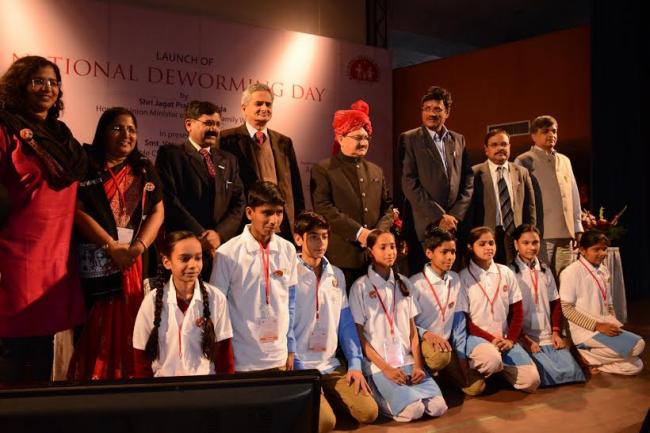April 26, 2024 04:34 (IST)

De-worming initiative to make India worm free launched
Kolkata, Feb 10 (IBNS): National De-worming Day is being observed on Tuesday and in this connection Union Ministry of Health & Family Welfare launched the National De-worming initiative at Jaipur.
De-worming is administering an antihelmintic drug to a human or animal to rid them of parasites, such as roundworm, hookworms, flukes and tapeworm. Mass deworming campaigns of school children have been used both as a preventive as well as a treatment method for helminthiasis which includes soil transmitted helminthiasis in children.
Children can be treated by administering for example Mebendazole and Albendazole. The cost is relatively low. One tablet of Albendazole rids the child of parasitic worms which live in the child’s intestines and eat the nutrients the child needs for healthy mental and physical development. This tablet is safe for both infected and non-infected children and has a pleasant flavor.
Helminths are a group of parasites commonly referred to as worms and include schistosomes and soil-transmitted helminths. Such infections are among the most common infections in developing countries.While mild infections often go unnoticed, more severe worm infections can lead to abdominal pain, listlessness, iron-deficiency anemia, malnutrition, stunting, and wasting.. Infections can also cause cognitive impairment as well as tissue damage that may require corrective surgery
To reduce the worm burden, WHO recommends periodic drug treatment (De-worming) of all school-age children living in endemic areas. WHO is of the view that treating children for worms—which affect an estimated 600 million school-aged children worldwide—improves school attendance, health, and long-run productivity. Oral de-worming drugs are extremely effective at killing most varieties of worms with a single dose, at negligible cost.
So, de-worming treatment is not only highly effective and inexpensive, it is easy to administer through public schools and brings benefits to children years after treatment. With hundreds of millions of children still at risk of worm infection worldwide, providing free school-based de-worming treatment is an easy policy “win” for health, education, and development.
School Health program under National Rural Health Mission(NRHM), provides for De-worming as per national guidelines on bi-annually supervised schedule. In the state of Bihar world’s largest school-based de-worming initiative was taken up earlier and also the Delhi government had conducted such campaigns. According to WHO estimates, nearly 24 crore children in the age group of 1-14 years are at risk of intestinal parasitic worm infestation.
The new De-worming Initiative of the Health Ministry aims to de-worm all pre-school and school-age children (enrolled and non-enrolled) between the ages of 1-19 years. In the first phase about 14 crore children across eleven States/UT of Assam, Bihar, Chhattisgarh, Dadra & Nagar Haveli, Haryana, Karnataka, Maharashtra, Madhya Pradesh, Rajasthan, Tamil Nadu and Tripura will be covered; while nearly 10 crore will be targeted in the second phase.
In the first phase staring from the National De-worming Day on 10th February 2015, Albendazole tablets will be given to all targeted children; half tablet to 1-2 years children and one full tablet for 2-19 years. The children who are left out will be covered by a mop-up round to be carried out till 14th February 2015.
Union Health Minister has emphasized the need to target intestinal parasitic worms among the children to achieve status of being ‘Worm-free’ in India, after getting the ‘Polio-free’ status,. He has appealed to all MPs, MLAs, and local public representatives in addition to school teachers, ASHAs and Anganwadi workers for converging and supporting the Government in its mission to achieve Worm Free India.
This initiative needs to be coupled with improved sanitation, hygiene, and availability of safe drinking water for reducing worm load with active partnership and participation of the other ministries such as M/o Women and Child Development, M/O Human Resources Development, M/o Panchayati Raj and M/o Water and Sanitation.
The deworming initiative is expected to help in achieving the aim of ‘Swachh Bharat’ as envisioned by the Prime Minister. This small, time tested initiative can have multiplier effect on various sectors like health, education, development at negligible cost.
Support Our Journalism
We cannot do without you.. your contribution supports unbiased journalism
IBNS is not driven by any ism- not wokeism, not racism, not skewed secularism, not hyper right-wing or left liberal ideals, nor by any hardline religious beliefs or hyper nationalism. We want to serve you good old objective news, as they are. We do not judge or preach. We let people decide for themselves. We only try to present factual and well-sourced news.
Support objective journalism for a small contribution.
Latest Headlines
UN officials launch global campaign to combat climate emergency Wed, Apr 24 2024
Satellite imagery shows significant expansion in 27% identified glacial lakes in Himalayas: ISRO Tue, Apr 23 2024
Taiwan hit by 93 aftershocks, strongest touches 6.3 magnitude Tue, Apr 23 2024
World Meteorological Organization data shows heatwave deaths increased across almost all Europe in 2023 Mon, Apr 22 2024
Google marks World Earth Day with a unique doodle which gives a strong message to people Mon, Apr 22 2024
Vattikuti Foundation announces Brady-Vattikuti Robotic Academy hands-on masterclass in Urology Sat, Apr 20 2024
WHO expresses concern over spread of avian influenza to humans Fri, Apr 19 2024







